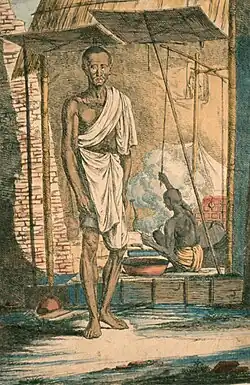Karmakar
Karmakar (Bengali: কর্মকার) is a Bengali Hindu caste spread throughout West Bengal, Assam, Tripura and Bangladesh. The Karmakars are traditionally blacksmiths by trade.

History
The Karmakars used to be blacksmiths by profession. Over time, the Karmakars have produced engineering masterpieces. In 1637, Janardan Karmakar (Blacksmith) of Sylhet built the great gun of Murshidabad, the Jahan Kosha Cannon 'Destroyer of the World', which is 18 feet (5.5 m) in length and weighs around 7 tons.[1][2][3] Another grand cannon named Dal Madal Kaman was built by Jagannath Karmakar in 1565 for the kingdom of Mallabhum.[4] In the late 18th century, Wiiliam Carey of serampore teamed up with Panchanan Karmakar to make Bengali wooden types.[5]
Notables
- Radhu Karmakar (1919–1993), cinematographer and film director
- Prokash Karmakar (1933–2014), artist
- Romuald Karmakar (b. 1965), French and German film director
- Joydeep Karmakar (b. 1979), sports shooter
- Prasanta Karmakar (b. 1980), swimmer
- Dipa Karmakar (b. 1993), gymnast
- Panchanan Karmakar (d. 1804), inventor of the Bangla Font
- Tamalika Karmakar (b. 1970), actress and national award winner
- Kalidas Karmakar (b. 1946), noted artist and Ekushey Padak laureate
- Vidyadhar Karmakar (b.1925), actor
References
- ^ Miah, Md. Abul Hashem (June 1991). "Cannons in the Subcontinent with a Special Reference to the Historical Cannons of Bengal". Journal of the Asiatic Society of Bangladesh: Humanities. 36 (1): 65–66, 73.
and the huge [page 66:] cannon of Murshidabad are believed to have been made by Janardan Karmakar (Blacksmith) of Sylhet ... [page 73:] known as "Jahan Kusha' ... cast in Jahangirnagar in A. H. 1047 (1637 A. D.) The cannon is 18' in length.
- ^ The Land of the Rupee. Bennett, Coleman & Co. 1912. p. 100.
- ^ District Census Handbook, West Bengal: Birbhum India. Superintendent of Census Operations, West Bengal, Bisweswar Ray, Superintendent, Government Printing, the University of Michigan
- ^ Dasgupta, Biswas & Mallik 2009, p. 55.
- ^ "Flower power resurrects Carey legacy". timesofindia.com. The Times Of India Kolkata. Archived from the original on September 23, 2015. Retrieved 9 February 2012.
Bibliography
- Dasgupta, Gautam Kumar; Biswas, Samira; Mallik, Rabiranjan (2009), Heritage Tourism: An Anthropological Journey to Bishnupur, A Mittal Publication, p. 55, ISBN 978-8183242943
